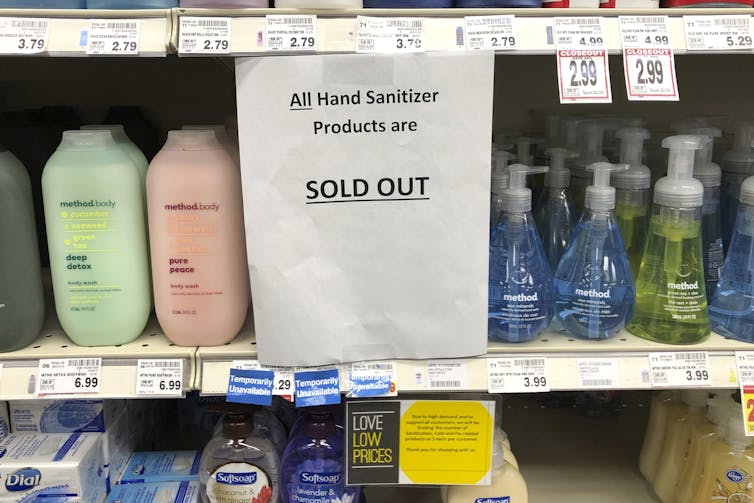
Experts in autocracies have pointed out that it is, unfortunately, easy to slip into normalizing the tyrant, hence it is important to hang on to outrage. These incidents which seem to call for the efforts of the Greek Furies (Erinyes) to come and deal with them will, I hope, help with that. As a reminder, though no one really knows how many there were supposed to be, the three names we have are Alecto, Megaera, and Tisiphone. These roughly translate as “unceasing,” “grudging,” and “vengeful destruction.”
So, back to history one more time. This period – the first century CE – is even closer to their youth than the Middle Ages. But human nature really doesn’t change. Our understanding of it, of course, may change. But the behavior of humans in large groups was and remains predictable.
==================================================================
Why a Roman philosopher’s views on the fear of death matter as coronavirus spreads

Internet Archive Book Images/Flickr
Thomas Nail, University of Denver
With the global spread of the new coronavirus, fears about illness and death weigh heavily on the minds of many.
Such fears can often result in a disregard for the welfare of others. All over the world, for example, essential items such as toilet paper and hand sanitizer have been sold out, with many people stockpiling them.
A first-century B.C. Roman poet and philosopher, Lucretius was worried that our fear of death could lead to irrational beliefs and actions that could harm society. As a philosopher who has just published a book on Lucretius’ ethical theory, I cannot help but notice how his predictions have come true.
Lucretius and his beliefs
Lucretius was a materialist who did not believe in gods or souls. He thought that all of nature was made of continually changing matter.
Since nothing in nature is static, everything eventually passes away. Death, for Lucretius, allowed for new life to emerge from the old.
When there is no immediate danger of dying, people are less afraid of death, Lucretius says in “The Nature of Things.” But when illness or danger strike, people get scared and begin to think of what comes after death.
Some people might make themselves feel better by imagining that they have immaterial souls that shed their bodies or that there is a benevolent God, Lucretius writes. Others might imagine an eternal afterlife, as the philosopher Todd May argues in his 2014 book, “Death.”
The fear of death may lead people to seek comfort in the idea that there is an immortal soul that is more important than the body and the material world.
Fear and social divisions
However, an ethical danger of such beliefs, Lucretius argues, is that people may become preoccupied with something that literally does not matter at all.
This fear and anxiety, Lucretius says, stains everything in life. It “leaves no pleasure clear and pure” and it could even lead to “a great hatred of life.” Studies show that anxiety about death can lower one’s immune system and make it more vulnerable to infections.
Additionally, Lucretius says, the fear of death can also lead people to create social divisions. When people are afraid of dying, they might think that withdrawing from others will help keep danger, disease and death away.
“This is why people, attacked by false fears, desire to escape far away and to withdraw themselves,” Lucretius says.
This phenomenon is well documented in terror management studies. The fear of death results in a desire to escape from disadvantaged groups.
In China, for example, rural migrant workers were blocked from quarantined cities, kicked out of apartments and turned away by factory owners, as authorities tried to control the spread of the coronavirus.

AP Photo/Ted S. Warren, File
In the U.S., poorer workers do not have the luxury to work from home when schools close, and cannot afford to take sick days or see a doctor. They are thus more vulnerable compared to those who can afford to isolate themselves.
Asian Americans are also experiencing increased discrimination following the coronavirus spread. Fewer people are going to Chinese restaurants out of fear of being infected. Asian American schoolchildren too have been targets of racist comments.
Focus on staying healthy
The fear of death is irrational, according to Lucretius, because once people die they will not be sad, judged by gods or pity their family; they will not be anything at all. “Death is nothing to us,” he says.
Not fearing death is easier said than done. That is why, for Lucretius, it is the most important ethical challenge of our life.
Instead of worrying about what may happen after death, Lucretius advises people to focus on keeping their bodies healthy and helping others do the same.
Thomas Nail, Associate Professor of Philosophy, University of Denver
This article is republished from The Conversation under a Creative Commons license. Read the original article.
==================================================================
Alecto, Megaera, and Tisiphone, I believe it would be helpful if those of us who can reason and learn do our best to adopt patience with those who can’t and don’t. A little understanding can go a long way. Beyond that, we need to stay strong and keep up our resistance – now in multiple senses.
The Furies and I will be back.
10 Responses to “Everyday Erinyes #208”
Sorry, the comment form is closed at this time.

Thanks for an interesting read, Joanne. You are right human nature hasn’t changed much over the past 2000 years. Mens sane in corpore sano is still something we all need to aspire to; sadly too many fail on both accounts.
The Furies need to go after 1) those creeps who stockpile hand sanitizer, masks (not all of which are effective) and other supplies, then resell them at gouging prices; 2) jerks who spread any misinformation about the virus; 3) a-holes who use the pandemic as an excuse to discriminate against Asians; 4) employers who won’t give their workers paid sick leave so people have to come in even when they are ill and contagious.
Lucretius has some excellent points. To that I add the problem of preachers who weaponize the afterlife, using the fear of Hell as a scourge to keep their flocks in line and compel money from their pockets. Sorry your kids are sick of rice and beans every night, but Reverend Smiley needs to buy a new Infiniti.
I agree with Lona/Freya’s comments above.
Read this morning, that somebody bought all the TP, and sanitizers from their local store(s), turned around and re-sold it on-line for more than they paid for it, and made a profit. ugh!
Forgot where I read that. Folks need to stop ‘panic buying’.
My local store had long, winding lines to the checkout, and the shelves are bare with the above mentioned items. I used to enjoy getting out to shop, but no more for me.
Thanks, Joanne and Furies for this great post.
In CA, our state’s short term disability payment system will provide benefits to those whose income is affected by the pandemic.
CO is requiring paid sick leave in two of the industries often without sick leave benefits:https://www.cpr.org/2020/03/10/colorado-will-require-paid-sick-leave-for-15-of-workers-in-response-to-coronavirus/
The bill passed in the House in the wee hours this morning, supported by Trump, includes sick leave, too:https://www.politico.com/news/2020/03/13/congress-coronavirus-stimulus-package-deal-friday-128140?emci=c8fef42e-6865-ea11-a94c-00155d03b5dd&emdi=62b51866-7a65-ea11-a94c-00155d03b5dd&ceid=445534And the Medicaid waivers the declaration of emergency permit can be used to support health and not just to cover care from health care providers if the state designs their waiver that way (also permits more streamlined eligibility process to get people tested, diagnosed fast)
Some of the behaviors we’ve seen are also akin to the denial phase of grief. Some identify the overshopping to be the one thing people feel like they can control in this out of control scenario and that motivation may actually be to do their part to help slow the spread…and given some of the research out of China now being shared indicating the virus can remain in a person more than double the 14 days we’ve been hearing, for a few of the shoppers they may actually end up needing all they bought…
Very interesting, JD.
As one facing death, I’m not afraid being dead. I’d like to be reincarnated as a lesbian, but I’ll settle for heaven. But if there is no afterlife, I shall not be disappointed. However, while being dead doesn’t frighten me, the process of getting to that point could be horrid, and I confess some fear over that.
You wouldn’t run out and do anything stupid, fear or no fear.
No, I will not vote Republican under any circumstances.
If I understand you correctly, I’m pretty much in agreement: The end result is not nearly as frightening as GETTING to the end results.
You understand me perfectly.
💉
I too agree with Lona and Freya’s comments.
It’s despicable the way people are hoarding items. I could see buying one or two extra, but not buying the store out. Really a shame to think that it isn’t going to get any better.
Excellent post.
Thanks Joanne